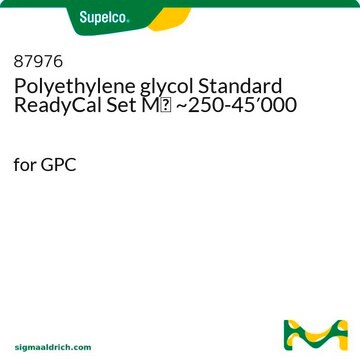81293
Poly(ethylene glycol)
analytical standard, for GPC, 6,000
Synonym(s):
PEG
About This Item
Recommended Products
grade
analytical standard
for GPC
Quality Level
shelf life
limited shelf life, expiry date on the label
mol wt
Mn ~5850
Mp ~6240
Mw ~6000
technique(s)
gel permeation chromatography (GPC): suitable
Mw/Mn
~1.03
application(s)
cleaning products
cosmetics
food and beverages
personal care
format
neat
storage temp.
2-8°C
SMILES string
C(CO)O
InChI
1S/C2H6O2/c3-1-2-4/h3-4H,1-2H2
InChI key
LYCAIKOWRPUZTN-UHFFFAOYSA-N
Looking for similar products? Visit Product Comparison Guide
Application
- Quantifying thiolated chemical additives for copper electroplating process: Demonstrates the use of Poly(ethylene glycol) (PEG) in enhancing the performance of copper electroplating, a critical application in electronic manufacturing (Wang et al., 2024).
- Novel fibrous Ag(NP) decorated clay-polymer composite: Highlights PEG′s role in developing composites for water purification, addressing the urgent need for efficient removal of micro-pollutants and bacteria from water sources (Goswami et al., 2024).
- Phenylacetylene-Terminated Poly(Ethylene Glycol) as Ligands for Colloidal Noble Metal Nanoparticles: Introduces a novel PEG-based ligand system for noble metal nanoparticles, advancing applications in catalysis and materials science (Duan et al., 2024).
- Assessing the Effect of Surface Coating on the Stability, Degradation, Toxicity and Cell Endocytosis/Exocytosis of Upconverting Nanoparticles: Explores the role of PEG in modifying nanoparticles to enhance their biocompatibility and stability, crucial for drug delivery and diagnostic applications (Arellano et al., 2024).
Storage Class Code
10 - Combustible liquids
WGK
WGK 1
Flash Point(F)
281.5 °F - closed cup
Flash Point(C)
138.6 °C - closed cup
Personal Protective Equipment
Regulatory Listings
Regulatory Listings are mainly provided for chemical products. Only limited information can be provided here for non-chemical products. No entry means none of the components are listed. It is the user’s obligation to ensure the safe and legal use of the product.
JAN Code
81293-BULK:
81293-1G:
81293-VAR:
81293-1G-KC:
Choose from one of the most recent versions:
Already Own This Product?
Find documentation for the products that you have recently purchased in the Document Library.
Customers Also Viewed
Our team of scientists has experience in all areas of research including Life Science, Material Science, Chemical Synthesis, Chromatography, Analytical and many others.
Contact Technical Service


